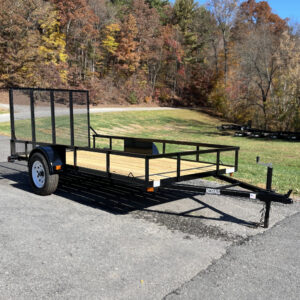What to Consider When Buying Utility Trailers
Utility trailers, the silent workhorses of our daily lives, are there when we need them most. From moving furniture to hauling landscaping equipment, they make our tasks manageable.
So, how do we go about choosing one of these lifesavers? In this article, well walk you through the critical aspects of purchasing a utility trailer, ensuring that you come out on the other side confident and well-informed.
So, buckle up and let’s dive into the riveting world of utility trailers.
The Harmony of Dimensions: Trailer Length and Vehicle Compatibility
When it comes to utility trailers, compatibility with your vehicle is key. Let’s take a look at what you should be aware of.
Keeping an Eye on Towing Capacity
Your vehicle’s towing capacity isn’t just a number in the owner’s manual. It’s a limit you should not cross. Just as an ant can’t lift an elephant, your vehicle can only pull so much weight. Respecting this limit keeps your engine humming and your vehicle on the road.
The right trailer isn’t the one that’s most hefty but the one that fits your vehicle’s towing capacity.
The Weight-Limit Tango
Now, when you’re considering the trailer length, it’s not a simple case of ‘longer equals better.’ Yes, longer trailers can carry more. However, there’s a catch. The more they carry, the more they weigh.
So, you end up in a tug of war between the capacity of your vehicle and the weight of your trailer and cargo. You must find the sweet spot where everything balances out. Remember, in this tango, balance is everything.
Uncovering the Details: The Trailer Inspection
Think about buying a house. You wouldn’t dream of purchasing it without inspecting every nook and cranny, right? The same rule applies to buying utility trailers. Let’s explore this process.
The Base of Operations: The Trailer Floor
When talking about a utility trailer, the floor forms the base of operations. It holds your cargo and bears the brunt of the load. Therefore, it’s essential to inspect the floor for any signs of damage or wear and tear. If it’s weak, your cargo is at risk.
Also, consider the floor material. Wooden floors might appeal to your wallet, but remember, they’re prone to rot and degradation. On the other hand, metal floors last longer but could become slippery in wet conditions. So, choose wisely, considering your cargo and the conditions you’ll be operating under.
The Supporting Act: The Trailer Frame
Like a sturdy skeleton is crucial for the human body, a strong frame is vital for a utility trailer. After all, it’s the frame that gives shape and strength to the trailer.
Inspect the frame for rust or any signs of damage. Also, the welds that hold the frame together should be strong and intact. A weak frame is like a ticking time bomb. It could collapse under the weight of the cargo, leading to potentially dangerous situations. Prevention is better than cure, right?
A Matter of Survival: Picking a Durable Trailer
Durability is a factor you cannot ignore when choosing a utility trailer. Its not just about strength, but also about the type of cargo, the frequency of use, and the operating conditions.
Deciphering the Cargo Code
What are you planning to haul in your utility trailer? Your answer to this question will heavily influence your choice.
Open trailers are fantastic for transporting sturdy equipment, such as motorcycles or landscaping gear. However, if you’re looking to transport weather-sensitive goods, enclosed trailers offer better protection. Moreover, if youre dealing with heavy cargo, consider tilt or dump trailers. They make the loading and unloading processes much easier.
Reading the Usage Pattern
How frequently will you use your trailer? Is it going to be used sporadically for weekend races or will it see daily action at construction sites?
Casual users, like motorsports enthusiasts, may need trailers for occasional events, while professional users, such as landscapers or contractors, might use them daily. Understanding your usage pattern can help you choose a trailer that withstands the expected wear and tear.
Ensuring Longevity: Maintenance and Care
Picture a utility trailer as a trusty steed. Like any steed, it needs your care to remain steadfast and reliable.
Cleanliness is Key
Regular cleaning goes a long way in maintaining a utility trailer. Dirt, debris, or grime can hide dents or rust, leading to bigger issues down the line. A thorough cleaning, especially after transporting corrosive materials, helps keep these problems at bay.
Preventive Measures: Rust and Corrosion
Rust and corrosion are the arch-nemesis of any trailer. The best defense is a good offense. Regularly inspect for any signs of rust and treat them promptly. Consider rust-proofing your trailer, an investment that will pay dividends in the long run.
Keeping It Moving: Wheel and Axle Care
Don’t forget about the wheels and axles. They bear the weight of the trailer and its cargo. Regularly check the tire pressure and tread, keep the axles lubricated, and have the wheel bearings inspected periodically.
Maintenance and care of your utility trailer may seem like an added chore, but it’s a vital routine to uphold. It’s all about keeping the journey smooth and uninterrupted.
Utility Trailers and the Art of Smart Buying
Choosing the right utility trailer is more than just picking the most robust or the largest option available. It’s about understanding your needs, the limits of your vehicle, and making an informed choice.
When you’re ready to buy, consider the trailer length, undertake a comprehensive trailer inspection, pick a compatible and durable trailer, and don’t forget to check the sturdiness of the trailer floor. It’s all about making a wise purchase, one that gives you value in the long run.
After all, the value of utility trailers extends far beyond the purchase; it’s a long-term investment for smoother and more efficient journeys.
Ready to make an informed decision on your next utility trailer purchase? Get in touch with us today, or check out our wide range of options designed to suit every need and budget.





